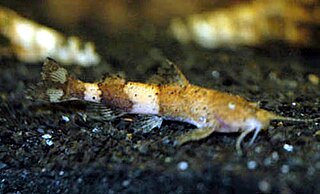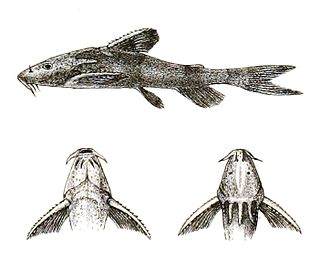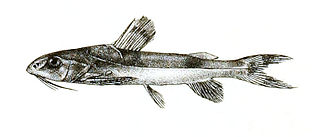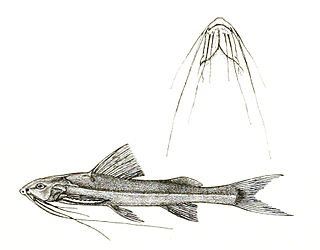
The stream catfishes comprise the family Akysidae of catfishes.

Sisoridae is a family of catfishes. These Asian catfishes live in fast-moving waters and often have adaptations that allow them to adhere to objects in their habitats. The family includes about 235 species.

Pseudolaguvia is a genus of South Asian river catfishes. These species inhabit hill streams and large rivers. P. tenebricosa is found in fast running, clear water; the river has a sandy bottom and numerous rocks and boulders and aquatic vegetation is absent. P. inornata is from clear, shallow, moderately flowing streams with a predominantly sandy bottom. P. muricata is found in clear, shallow, slow-flowing streams with a mixed substrate of sand and detritus; these fish are found amongst detritus in areas with current. P. ferula is also found in swift flowing waters with a mixed rocky/sandy bottom.

Glyptothorax is a genus of catfishes order Siluriformes of the family Sisoridae. It is the most species-rich and widely distributed genus in the family with new species being discovered on a regular basis. These species are distributed in the Black Sea basin, northern Turkey, south and east to the Yangtze River drainage in China and south throughout Indo-China to Java, Indonesia. They are found in Asia Minor and southwards to Southeast Asia. The genus is very diverse in the Indian subcontinent. Southeast Asian species tend to have restricted distributions.
Myersglanis is a genus of sisorid catfishes native to Asia.
Caelatoglanis zonatus is a species of catfish of the family Erethistidae. It is the only member of the monotypic genus Caelatoglanis.
Ayarnangra estuarius is a species of catfish of the family Erethistidae. It is the only member of the monotypic genus Ayarnangra.

Sisoroidea is a superfamily of catfishes. It contains the four families Amblycipitidae, Akysidae, Sisoridae, and Erethistidae; many sources also include Aspredinidae. With Aspredinidae, this superfamily includes about 42 genera and 230 species.

Conta is a small genus of South Asian river catfishes native to India and Bangladesh.
Erethistoides is a genus of South Asian river catfishes.

Erethistes is a genus of South Asian river catfishes.

Pseudecheneis is a genus of sisorid catfishes native to Asia.

Bagarius is an Asian genus of catfishes of the family Sisoridae. It includes five to six extant species and potentially one extinct fossil species, B. gigas.
Exostoma is a genus of sisorid catfishes native to Asia. These species are distributed in the Brahmaputra drainage of north-eastern India, and east and south to the Salween drainages in Burma. E. berdmorei is found in the Sittang and Salween drainages in Burma. E. labiatum is known from the Brahmaputra drainage in north-eastern India, but has also been recorded in the Salween drainage in Burma, the Ayeyarwady drainage in China, and the Brahmaputra drainage in Tibet and Burma. E. stuarti is from the Ayeyarwady River of Burma and India; however, it has not been collected since its original discovery. E. labiatum is found in mountain rapids.

Gogangra is a genus of sisorid catfishes native to Asia.

Sisor is a genus of catfishes native to Asia.

Gagata is a genus of sisorid catfishes native to Asia.

Nangra is a genus of sisorid catfishes native to Asia.
Pareuchiloglanis is a genus of sisorid catfishes native to Asia. These species are rheophilic catfish chiefly found in the headwaters of major rivers in South and East Asia. They originate from the Brahmaputra drainage in India, east and south to the Yangtze drainage in China and the Annamese Cordillera drainages in southern Vietnam. Two species are known from the Mekong River: P. myzostoma and P. gracilicaudata. Four species are known from the drainage of China: P. abbreviatus, P. gracilicaudata, P. myzostoma and P. prolixdorsalis.
Chimarrichthys kishinouyei is a species of sisorid catfish native to Asia.












